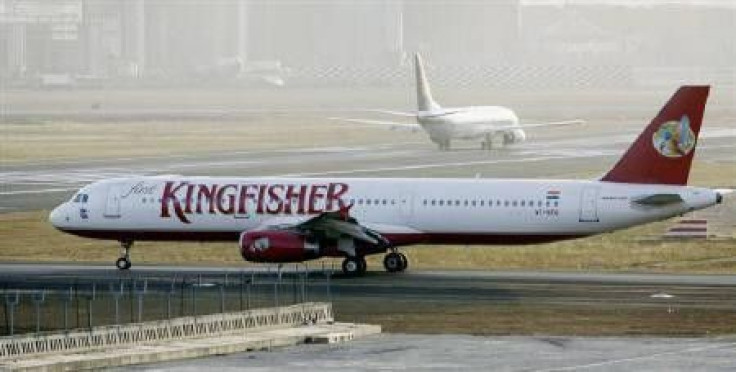Kingfisher Grounds Planes; Lenders Await Report

Lenders to cash-strapped Kingfisher Airlines, which has been grounding planes and cutting routes to stay aloft, are awaiting a report on the airline's viability before they approve a $133 million loan, banking sources said on Monday.
SBI Capital Markets Ltd, a unit of State Bank of India, has been hired by the banking consortium to draft a report on the carrier's financial outlook.
That report has yet to be submitted, two sources with direct knowledge of the matter said.
The chairman of State Bank of India, the biggest lender to Kingfisher, said the banks were looking for a solution.
We are trying to help Kingfisher, Pratip Choudhuri told Reuters on Monday morning.
Asked if the banks were open to lending more to the airline, he said: Everything is on the table.
Kingfisher shares rose more than 2 percent on the comments before closing up 0.23 percent at 21.75 rupees. The airline's shares have fallen about 67 percent since the start of the year, cutting its market value to about $200 million.
While there is no deadline for the viability report, banks have asked SBI Capital to work expeditiously, one source said.
Kingfisher, controlled by flamboyant liquor tycoon Vijay Mallya, has been seeking additional short-term working capital loans of about 7 billion rupees to fund operations. The airline has also been looking to raise equity.
Banks have re-iterated that any additional funds will only be considered once the viability report is before them and if banks are convinced about it, the source added.
The airline, which has a negative net worth, aims to halve its debt to about 37 billion rupees through the sale and lease-back of aircraft, sale of a property in Mumbai, and conversion of rupee loans into lower-interest foreign loans.
Conglomerate Sahara India, which co-owns Formula One motor racing team Sahara Force India along with Mallya, plans to lend it more than $47 million, a source familiar with the matter said.
The airline announced on Monday it would become part of the global oneworld alliance from February, which it said would help it improve its competitive offering and financial position.
TURBULENT TIMES
Kingfisher has not made a profit since it was set up in 2005. It has recently slipped to third place in market share in India after being overtaken by IndiGo, India's only profitable airline, as it cuts flights on loss-making routes.
Over 100 pilots have quit recently and suppliers, including airports and oil companies, have stopped extending credit.
A Kingfisher executive, who declined to be identified, told Reuters the airline had grounded 15 planes, but declined to say why or how long the planes had been grounded.
The Economic Times reported earlier that Kingfisher had grounded some of its Airbus planes, including the wide-bodied A330s used for international routes, because it was unable to meet maintenance and overhaul expenses.
An official at Mumbai's airport told Reuters that Kingfisher had grounded two aircraft there in recent weeks due to a lack of spare parts, but that there were no new flight cancellations.
A Kingfisher spokesman declined to comment.
Right now, Kingfisher needs a Santa Claus to get it out of this deep mess, said Rajan Mehra, executive director at the Asia Pacific Academy for Aviation and Hospitality.
Kingfisher's active fleet has now shrunk to 40 from 69 at the end of 2010, the Economic Times report said. That figure could not be confirmed by Reuters.
Grounding aircraft and cancelling flights is never a great way of cutting costs. You continue to bleed by paying fixed costs such as lease rentals and parking charges, Mehra said.
The aviation regulator is conducting a review of Kingfisher's finances, a process that is ongoing, an official with the regulator said on Monday, declining to be identified.
Kingfisher has pledged its brand, valued at 41 billion rupees, as collateral with its banks, government documents show. It has also pledged real estate and office equipment.
All but one of India's six main airlines are loss-making as they engage in aggressive price competition, even as they are squeezed by high jet fuel costs.
Indian airlines are forecast to lose up to $3 billion in the fiscal year that ends in March 2012. State-owned Air India, operating on government life support, is expected to account for more than half of that, the Centre for Asia Pacific Aviation has said.
© Copyright Thomson Reuters 2024. All rights reserved.











